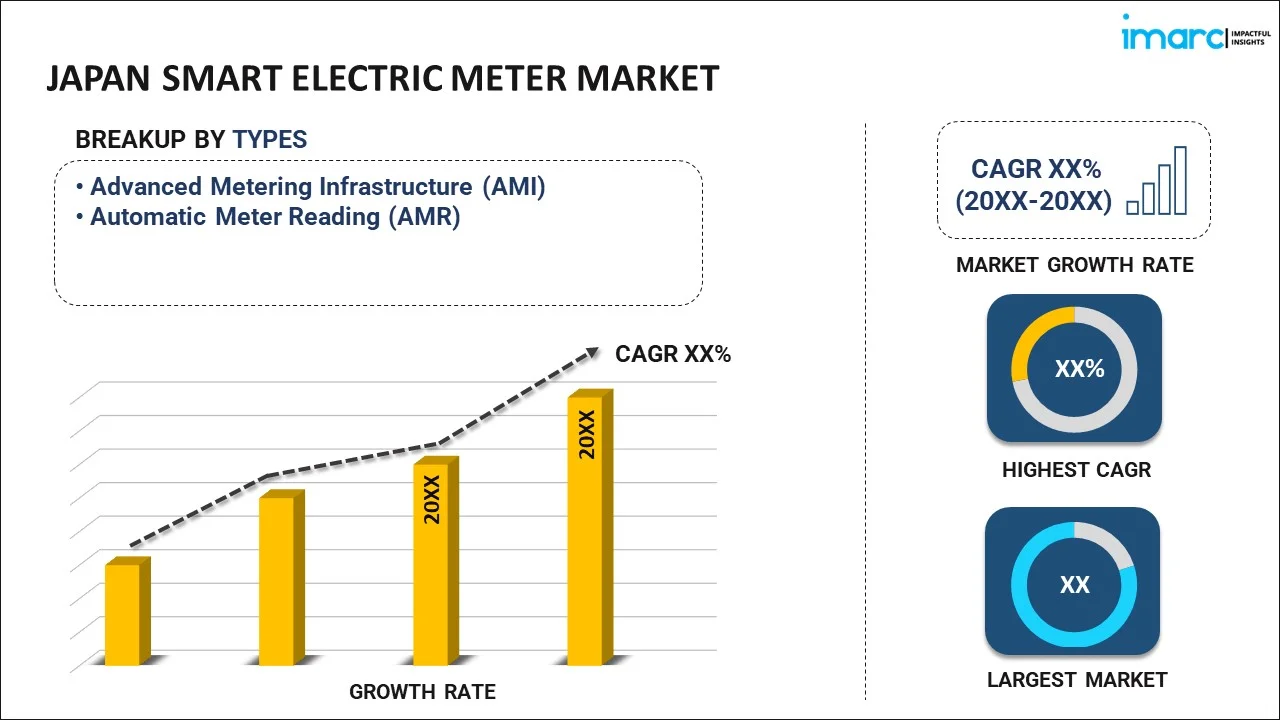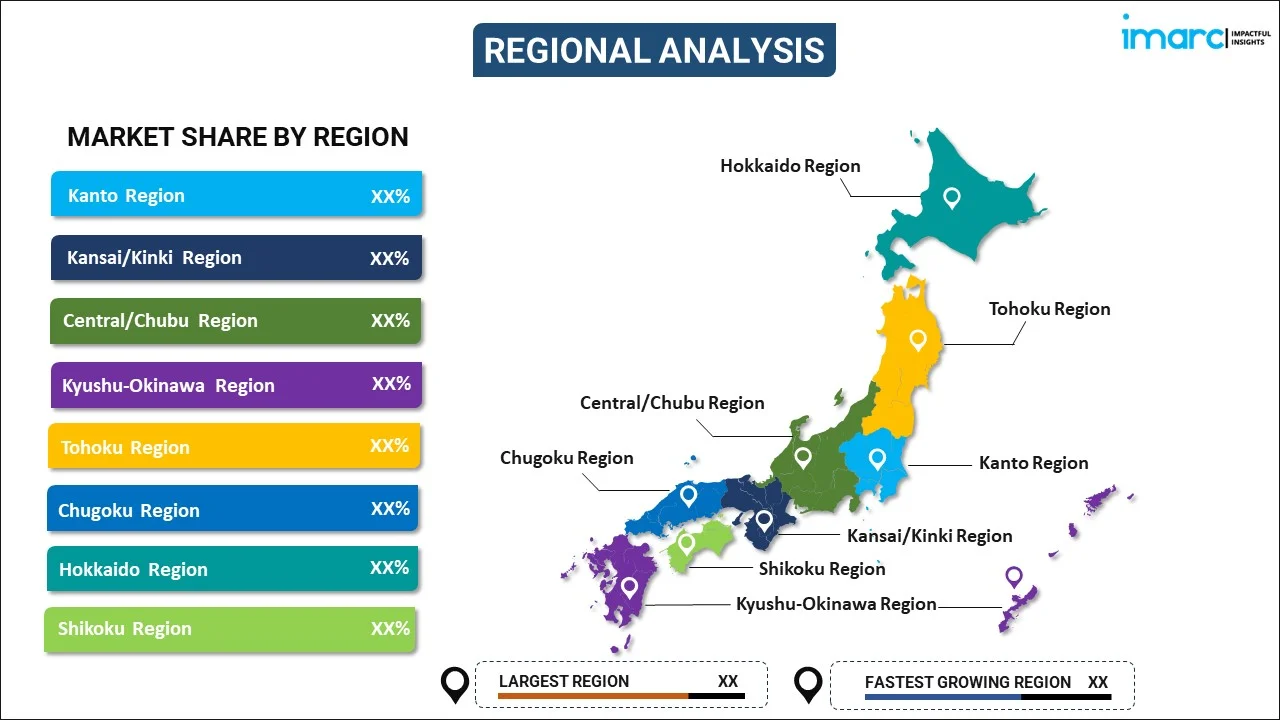
Japan Smart Electric Meter Market Report by Type (Advanced Metering Infrastructure (AMI), Automatic Meter Reading (AMR)), Phase (Single Phase, Three Phase), End User (Industrial, Commercial, Residential), and Region 2026-2034
Market Overview:
Japan smart electric meter market size reached USD 1.3 Billion in 2025. Looking forward, IMARC Group expects the market to reach USD 2.5 Billion by 2034, exhibiting a growth rate (CAGR) of 7.43% during 2026-2034. The increasing energy efficiency initiatives, favorable government support and regulations, rising energy costs, rapid grid modernization, growing environmental concerns, significant technological advancements, and implementation of demand response programs represent some of the key factors driving the market.
|
Report Attribute
|
Key Statistics
|
|---|---|
|
Base Year
|
2025 |
|
Forecast Years
|
2026-2034
|
|
Historical Years
|
2020-2025
|
| Market Size in 2025 | USD 1.3 Billion |
| Market Forecast in 2034 | USD 2.5 Billion |
| Market Growth Rate (2026-2034) | 7.43% |
Access the full market insights report Request Sample
A smart electric meter, also known as a "smart meter," is an advanced device used to measure and record electricity consumption in homes, businesses, and other facilities. Unlike traditional analog meters, smart meters are equipped with modern technology that allows for two-way communication between the meter and the utility company. Smart meters are capable of collecting detailed information about electricity usage, including the time of day when power is consumed. This data is transmitted securely to the utility provider, eliminating the need for manual meter readings and ensuring accurate billing. One of the key advantages of smart meters is their ability to provide real-time information to both consumers and utility companies. Homeowners can access their electricity usage data online or through a display unit in their homes, enabling them to make informed decisions about energy consumption and potentially reduce their electricity bills.
Japan Smart Electric Meter Market Trends:
Japan has been actively pursuing energy efficiency initiatives to reduce its carbon footprint and increase energy conservation. Smart electric meters play a vital role in this endeavor by providing real-time data on electricity consumption, enabling consumers to make informed choices about energy usage. Additionally, the high cost of energy in Japan has prompted consumers and businesses to seek ways to optimize their electricity usage. Smart meters provide the necessary data for consumers to identify energy-intensive appliances and adjust their consumption patterns, ultimately leading to cost savings. Other than this, the electric grid of Japan is undergoing modernization to accommodate renewable energy sources, such as solar and wind power. Smart meters facilitate the integration of these intermittent energy sources by providing real-time data on energy generation and consumption, aiding grid stability. Besides this, the growing environmental awareness has led to an increased interest in reducing carbon emissions. Smart meters help consumers and businesses track their electricity usage and reduce energy waste, aligning with the sustainability goals of Japan. In line with this, smart meters empower consumers with information about their energy consumption, fostering a sense of control over their electricity bills. This, in turn, drives demand for smart meters. Furthermore, utilities in Japan are implementing demand response programs that rely on smart meters to manage peak demand periods efficiently. These programs incentivize consumers to reduce energy use during high-demand times, benefiting both consumers and utilities. Moreover, advancements in smart meter technology, including improved communication protocols and data analytics capabilities, make these devices more efficient and cost-effective. This encourages utilities and consumers to invest in smart meter infrastructure, thus providing a positive thrust to market growth.
Japan Smart Electric Meter Market Segmentation:
IMARC Group provides an analysis of the key trends in each segment of the market, along with forecasts at the country level for 2026-2034. Our report has categorized the market based on type, phase, and end user.
Type Insights:

To get detailed segment analysis of this market Request Sample
- Advanced Metering Infrastructure (AMI)
- Automatic Meter Reading (AMR)
The report has provided a detailed breakup and analysis of the market based on the type. This includes advanced metering infrastructure (AMI) and automatic meter reading (AMR).
Phase Insights:
- Single Phase
- Three Phase
A detailed breakup and analysis of the market based on the phase have also been provided in the report. This includes single phase and three phase.
End User Insights:
- Industrial
- Commercial
- Residential
The report has provided a detailed breakup and analysis of the market based on the end user. This includes industrial, commercial, and residential.
Regional Insights:

To get detailed regional analysis of this market Request Sample
- Kanto Region
- Kansai/Kinki Region
- Central/ Chubu Region
- Kyushu-Okinawa Region
- Tohoku Region
- Chugoku Region
- Hokkaido Region
- Shikoku Region
The report has also provided a comprehensive analysis of all the major regional markets, which include Kanto Region, Kansai/Kinki Region, Central/ Chubu Region, Kyushu-Okinawa Region, Tohoku Region, Chugoku Region, Hokkaido Region, and Shikoku Region.
Competitive Landscape:
The market research report has also provided a comprehensive analysis of the competitive landscape. Competitive analysis such as market structure, key player positioning, top winning strategies, competitive dashboard, and company evaluation quadrant has been covered in the report. Also, detailed profiles of all major companies have been provided. Some of the key players include:
- Aichi Tokei Denki Co. Ltd.
- Holley Technology Ltd.
- Hubbell Incorporated
- Kyushu Electric Power Co. Inc.
- Osaki Electric Co. Ltd.
(Please note that this is only a partial list of the key players, and the complete list is provided in the report.)
Japan Smart Electric Meter Market Report Coverage:
| Report Features | Details |
|---|---|
| Base Year of the Analysis | 2025 |
| Historical Period | 2020-2025 |
| Forecast Period | 2026-2034 |
| Units | Billion USD |
| Scope of the Report | Exploration of Historical and Forecast Trends, Industry Catalysts and Challenges, Segment-Wise Historical and Predictive Market Assessment:
|
| Types Covered | Advanced Metering Infrastructure (AMI), Automatic Meter Reading (AMR) |
| Phases Covered | Single Phase, Three Phase |
| End Users Covered | Industrial, Commercial, Residential |
| Regions Covered | Kanto Region, Kansai/Kinki Region, Central/ Chubu Region, Kyushu-Okinawa Region, Tohoku Region, Chugoku Region, Hokkaido Region, Shikoku Region |
| Companies Covered | Aichi Tokei Denki Co. Ltd., Holley Technology Ltd., Hubbell Incorporated, Kyushu Electric Power Co. Inc., Osaki Electric Co. Ltd., etc. |
| Customization Scope | 10% Free Customization |
| Post-Sale Analyst Support | 10-12 Weeks |
| Delivery Format | PDF and Excel through Email (We can also provide the editable version of the report in PPT/Word format on special request) |
Key Questions Answered in This Report:
- How has the Japan smart electric meter market performed so far and how will it perform in the coming years?
- What has been the impact of COVID-19 on the Japan smart electric meter market?
- What is the breakup of the Japan smart electric meter market on the basis of type?
- What is the breakup of the Japan smart electric meter market on the basis of phase?
- What is the breakup of the Japan smart electric meter market on the basis of end user?
- What are the various stages in the value chain of the Japan smart electric meter market?
- What are the key driving factors and challenges in the Japan smart electric meter?
- What is the structure of the Japan smart electric meter market and who are the key players?
- What is the degree of competition in the Japan smart electric meter market?
Key Benefits for Stakeholders:
- IMARC’s industry report offers a comprehensive quantitative analysis of various market segments, historical and current market trends, market forecasts, and dynamics of the Japan smart electric meter market from 2020-2034.
- The research report provides the latest information on the market drivers, challenges, and opportunities in the Japan smart electric meter market.
- Porter's five forces analysis assist stakeholders in assessing the impact of new entrants, competitive rivalry, supplier power, buyer power, and the threat of substitution. It helps stakeholders to analyze the level of competition within the Japan smart electric meter industry and its attractiveness.
- Competitive landscape allows stakeholders to understand their competitive environment and provides an insight into the current positions of key players in the market.
Need more help?
- Speak to our experienced analysts for insights on the current market scenarios.
- Include additional segments and countries to customize the report as per your requirement.
- Gain an unparalleled competitive advantage in your domain by understanding how to utilize the report and positively impacting your operations and revenue.
- For further assistance, please connect with our analysts.
 Request Customization
Request Customization
 Speak to an Analyst
Speak to an Analyst
 Request Brochure
Request Brochure
 Inquire Before Buying
Inquire Before Buying




.webp)




.webp)












